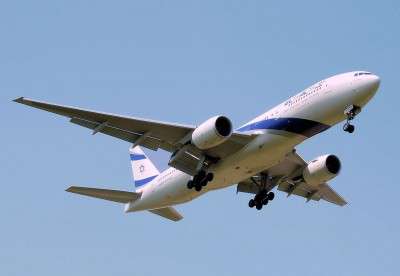
El Al, Israel’s national airline, will offer direct flights between Tel Aviv and Boston via Logan International Airport beginning June 2015, Massachusetts Gov. Deval Patrick announced Monday.
Prior to the addition of this flight, Boston was one of the largest U.S.-Israel hubs that lacked a direct flight to Tel Aviv. It is expected that the flight will foster a stronger relationship between Massachusetts and Israel, as well as promote the growth of the Israeli economy. Israeli-founded businesses in Massachusetts currently contribute to roughly 3 percent of the state’s gross domestic product, according to a Monday press release from the Consulate General of Israel to New England.
“Direct flights pave the way for further strengthening of Israel-U.S. ties, both economically and culturally,” said Israel’s Consul General Yehuda Yaakov in a Monday statement. “This will surely serve to increase the collaboration already present and thriving in New England. Furthermore, we look forward to seeing even more of our friends explore firsthand our diverse society and rich history, as well [as] sharing our adopted home with fellow Israelis.”
The Consulate General of Israel to New England has been working for decades to support Israeli companies in Boston and has been pushing for a direct flight between the two cities, Yaakov later said in an email.
“Direct flights will further strengthen an already-thriving relationship between Israel and the United States,” he said. “The decision was made by officials at El Al and Massport [Massachusetts Port Authority], who decided conditions were ripe. The consulate simply encouraged and assisted the process wherever possible.”
Patrick has encouraged international accessibility to Boston throughout his term, Yaakov said.
“The strong business ties between New England and Israel made direct flights to Israel an obvious goal,” he said.
A study by the New England-Israel Business Council in December 2013 revealed that there are over 200 Israeli-owned businesses operating in Massachusetts, creating more than $6 billion in revenue and providing more than 6,000 jobs, said Adi Golani, executive director at the NEIBC.
Opening a direct flight encourages the growth of Israeli businesses in Massachusetts, as the commute between the two cities becomes far easier, she said.
Not only will businesses be impacted by the direct flight, but Israeli students will also benefit as they have easier means of traveling home, Golani said.
An average of 91 passengers travel between Tel Aviv and Boston daily, she said. With improved traveling circumstances, more businesses may decide to set up shop in Boston, improving the city’s economy as a whole.
“Usually the flights that go out of Boston to Tel Aviv either goes through Europe or somewhere else in the U.S., either New York, New Jersey, Philadelphia, the main routes to Tel Aviv,” she said. “We can see in the past that when we conducted the survey, companies said that one of the things that will impact them when choosing Massachusetts as their home away from home is a direct flight.”
Several Boston residents said they had mixed feelings about the addition of a direct flight to Israel, considering there has been conflict over the past several months between Israel and Syria over the land that both parties believe is rightfully their own.
Katie Stotler, 23, of Brighton, said the convenience outweighs any reason to be concerned.
“If you’ve got to go, you’ve got to go,” she said. “If you’ve got family there, you’ve got to go see them. If you want to vacation, there you go. You can’t say no to somebody wanting to do something.”
Dianni Vega, 20, of Dorchester, said she considers the threat of danger too great a risk.
“Due to the fact that it might be dangerous, it’s not alright,” she said. “It’s people’s safety that’s in danger, and you never know what can happen when you’re mid-flight. It’s better to be on the safe side than anything else.”
Kyle Johannessen, 29, of Brighton, said he does not know why there would be controversy with the flight.
“We’ve been allied with Israel for such a long time,” he said. “Americans can feel relatively safe there — safer than most other places in that region. I don’t feel like cutting off easy access to travel to that area would be beneficial to Americans. We should be able to see that culture and be a part of it.”














